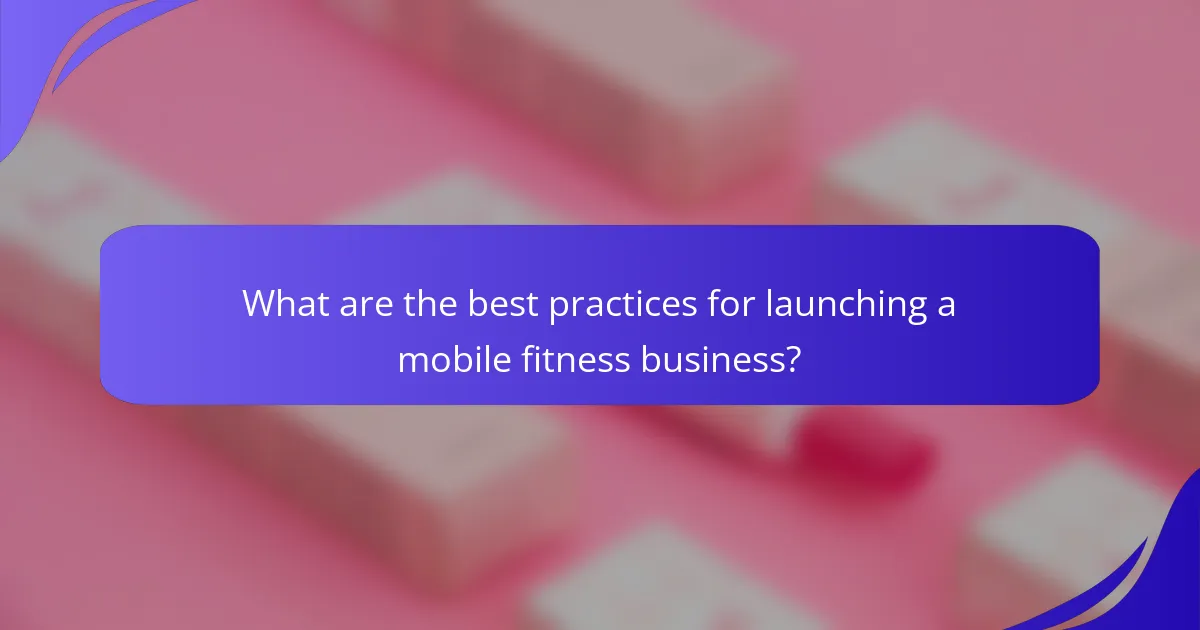Mobile business ideas for fitness enthusiasts can enhance health, flexibility, and income potential. Explore app development for workout tracking, online coaching for personalised training, fitness merchandise for e-commerce, and subscription services for meal plans. These strategies leverage technology and community engagement to create diverse revenue streams and cater to individual client needs. Focus on market research and a strong online presence to successfully launch and sustain your mobile fitness business.

What are the most viable mobile business ideas for fitness enthusiasts?
Mobile business ideas for fitness enthusiasts include app development, online coaching, fitness merchandise, and subscription services. These ideas leverage technology to enhance health, flexibility, and income potential.
1. Fitness App Development: Create apps focusing on workout tracking, nutrition planning, or virtual classes. The global fitness app market is projected to reach $14 billion by 2026.
2. Online Coaching: Offer personalised training programmes through video calls or pre-recorded sessions. This model provides flexibility for both trainers and clients.
3. Fitness Merchandise: Sell branded fitness gear, supplements, or health products through an e-commerce platform. The fitness apparel market is expected to grow to $231 billion by 2024.
4. Subscription Services: Develop a subscription model for meal plans, workout programmes, or wellness content. This creates a steady income stream and builds community engagement.
How can personal training be adapted for mobile services?
Personal training can be effectively adapted for mobile services by offering flexible scheduling and personalised workouts at clients’ locations. Trainers can utilise mobile apps to track progress, provide virtual coaching, and deliver customised fitness plans. This approach enhances convenience and accessibility, catering to clients’ busy lifestyles. Additionally, incorporating technology like video sessions and fitness tracking devices can elevate the training experience, making it more engaging and results-oriented.
What tools are essential for mobile personal trainers?
Essential tools for mobile personal trainers include fitness tracking apps, portable equipment, and scheduling software. These tools enhance client engagement, streamline workouts, and manage appointments effectively. Fitness tracking apps provide real-time data on performance metrics, while portable equipment like resistance bands and dumbbells allows for versatile training sessions. Scheduling software ensures efficient time management, enabling trainers to maximise their service offerings.
What role does nutrition coaching play in mobile fitness businesses?
Nutrition coaching is essential in mobile fitness businesses as it enhances client results and satisfaction. It provides personalised dietary guidance, helping clients achieve specific fitness goals. This coaching can increase client retention by fostering accountability and trust. Unique attributes include the flexibility to offer tailored meal plans and ongoing support, which are critical for client success. As a result, integrating nutrition coaching can significantly boost a mobile fitness business’s reputation and income potential.
How can mobile nutrition coaching be effectively delivered?
Mobile nutrition coaching can be effectively delivered through personalised apps, virtual consultations, and interactive meal planning tools. These methods enhance client engagement and accountability. Incorporating features like progress tracking and feedback mechanisms further supports client success. Regular updates and community support foster motivation and adherence to nutritional goals.
What are the benefits of mobile fitness classes?
Mobile fitness classes offer convenience, flexibility, and accessibility, enhancing workout experiences. Participants can engage in fitness routines from various locations, eliminating travel time. This format accommodates diverse schedules, appealing to busy individuals. Additionally, mobile classes foster community and support through group interactions. The potential for increased income for fitness instructors arises from reaching a broader audience without geographical limitations.
What types of mobile fitness classes attract the most clients?
Mobile fitness classes that attract the most clients include yoga, high-intensity interval training (HIIT), and dance-based workouts. These classes offer flexibility, convenience, and a variety of formats appealing to diverse clientele.
Yoga classes promote relaxation and mindfulness, attracting clients seeking stress relief. HIIT sessions deliver efficient workouts, appealing to those with limited time. Dance-based classes combine fitness and fun, drawing in clients looking for engaging experiences.
Offering a range of class types enhances client retention and attracts new participants. Flexibility in scheduling and location further boosts appeal, making mobile fitness a lucrative business opportunity.
How can fitness enthusiasts leverage technology in their mobile businesses?
Fitness enthusiasts can leverage technology in their mobile businesses by utilising apps, wearables, and online platforms to enhance client engagement and streamline operations. Mobile fitness apps can offer personalised workout plans and track progress, improving user experience. Wearable devices provide real-time health data, enabling trainers to tailor programmes effectively. Online platforms facilitate virtual training sessions, expanding reach and flexibility. Integrating these technologies can boost income while enhancing client satisfaction and retention.
What apps can enhance client engagement for mobile fitness?
Mobile fitness apps that enhance client engagement include MyFitnessPal, Fitbit, Strava, Trainerize, and Peloton. These applications offer unique features such as personalised workout plans, community challenges, and progress tracking. MyFitnessPal excels in nutrition tracking, while Trainerize provides tailored coaching experiences. Engaging clients through social features can significantly boost retention and motivation.

What unique attributes set successful mobile fitness businesses apart?
Successful mobile fitness businesses stand out through unique attributes such as personalised services, innovative technology, and community engagement. Personalised services cater to individual client needs, enhancing satisfaction and retention. Innovative technology, like fitness tracking apps, offers clients real-time data and progress monitoring, creating a competitive edge. Community engagement fosters loyalty and word-of-mouth marketing, crucial for growth. These attributes collectively drive success in a saturated market, appealing to health-conscious consumers seeking flexibility and convenience.
How do niche markets influence mobile fitness business success?
Niche markets significantly enhance mobile fitness business success by targeting specific consumer needs. These markets allow businesses to tailor services, such as personalised training programmes or unique fitness classes, attracting dedicated clients. For example, focusing on senior fitness or postpartum recovery can create loyal customer bases. As a result, businesses can achieve higher engagement and retention rates. Unique attributes like community-building and specialised expertise further differentiate offerings, driving sustainable income growth.
What are some examples of niche mobile fitness services?
Mobile fitness services include personal training apps, virtual group classes, on-demand yoga sessions, mobile nutrition coaching, and fitness equipment rental services. These services cater to diverse fitness needs and enhance accessibility.
What innovative marketing strategies work for mobile fitness businesses?
Innovative marketing strategies for mobile fitness businesses include personalised training programmes, social media engagement, and community partnerships. Personalised programmes enhance client retention by addressing individual goals. Social media platforms allow for targeted advertising and client interaction, boosting brand visibility. Community partnerships can expand reach and credibility through collaboration with local health events or businesses.
How can social media be utilised for mobile fitness marketing?
Social media can effectively boost mobile fitness marketing by enhancing brand visibility and audience engagement. Platforms like Instagram and Facebook allow fitness businesses to share success stories, workout videos, and interactive content. Utilising targeted ads can reach specific demographics, increasing conversion rates. Engaging influencers in the fitness community can further amplify reach and credibility. Regularly posting valuable content fosters a loyal following, driving app downloads and subscriptions.

What rare attributes contribute to the longevity of mobile fitness businesses?
Diverse revenue streams and community engagement are rare attributes that enhance the longevity of mobile fitness businesses. These businesses often incorporate unique offerings such as personalised training plans, nutrition coaching, and wellness workshops, which attract a wider audience. Additionally, fostering a strong community through social media and local events creates loyalty and encourages word-of-mouth referrals. This combination of diverse offerings and community involvement not only sustains interest but also builds a resilient customer base over time.
How important is customer feedback in shaping mobile fitness offerings?
Customer feedback is crucial in shaping mobile fitness offerings as it directly influences product development and user satisfaction. By understanding user preferences and pain points, businesses can tailor their services to meet market demands. For instance, 70% of fitness app developers cite user feedback as a primary factor in feature enhancements. Furthermore, incorporating feedback leads to increased user retention, as customers feel valued and understood. This iterative process fosters innovation, ensuring offerings remain relevant and competitive in a rapidly evolving market.
What systems can be put in place for effective feedback collection?
To collect effective feedback, implement systems like surveys, online forms, and mobile apps. These tools allow fitness enthusiasts to share insights on services and products, enhancing user experience. Surveys can be tailored to specific attributes such as satisfaction and usability. Online forms facilitate quick responses, while mobile apps provide ongoing engagement. Regular analysis of feedback helps identify trends and areas for improvement, ensuring that business strategies align with customer needs.
What partnerships can enhance a mobile fitness business?
Collaborating with local gyms, health food stores, and wellness brands can significantly enhance a mobile fitness business. These partnerships provide access to a broader clientele and create opportunities for cross-promotions. For example, offering joint classes with a local gym can attract new clients and increase visibility. Additionally, partnering with health food stores allows for product discounts and promotional events, enriching the customer experience. Establishing relationships with wellness brands can lead to sponsorships and exclusive offers, further boosting credibility and income.
Which local businesses are ideal for collaboration in fitness?
Local businesses ideal for collaboration in fitness include gyms, health food stores, wellness centres, personal trainers, yoga studios, and nutritionists. These entities enhance community engagement and provide mutual benefits. Collaborating with gyms allows for shared promotions, while health food stores can offer discounts on products. Wellness centres can provide holistic services, and personal trainers can lead joint events. Yoga studios may host classes that attract diverse audiences, and nutritionists can contribute expert advice. Each collaboration can drive customer traffic and increase brand visibility.

What are the best practices for launching a mobile fitness business?
To successfully launch a mobile fitness business, focus on market research, branding, and customer engagement. Identify your target demographic and tailor services to meet their needs. Develop a strong online presence through a website and social media platforms to attract clients. Utilise unique attributes like personalised training plans and flexible scheduling to differentiate your offerings. Leverage technology for scheduling and payment processing to streamline operations. Finally, gather feedback to continuously improve services and build a loyal customer base.
How should pricing be structured for mobile fitness services?
Pricing for mobile fitness services should be flexible and competitive to attract clients. Consider offering tiered packages based on session frequency and duration. A common structure includes pay-per-session, monthly memberships, and discounted packages for multiple sessions.
For example, a pay-per-session rate may range from £30 to £100, depending on the trainer’s experience and service offered. Monthly memberships can be priced between £200 and £400, providing clients with consistent access to services. Offering discounts for upfront payments encourages commitment and enhances cash flow.
Additionally, consider unique attributes like personalised training plans or group sessions to differentiate your offerings. This approach can enhance perceived value and client retention.
What common mistakes should be avoided when starting a mobile fitness business?
To succeed in a mobile fitness business, avoid common mistakes like inadequate market research, neglecting legal requirements, and poor marketing strategies. Failing to define your target audience can lead to ineffective services. Additionally, overlooking financial planning may result in cash flow issues. Lastly, not leveraging technology can hinder client engagement and growth.
What expert insights can guide new mobile fitness entrepreneurs?
To succeed as a mobile fitness entrepreneur, focus on building a strong brand and understanding your target market. Emphasise unique offerings such as personalised training plans and flexible scheduling. Leverage technology for client engagement and tracking progress. Networking with local health professionals can enhance credibility and attract clients. Stay informed about industry trends to adapt services accordingly.



